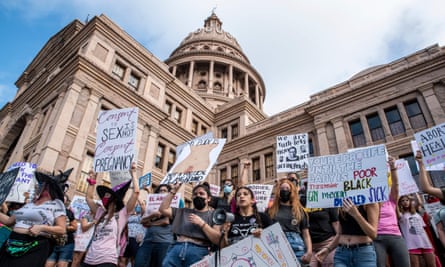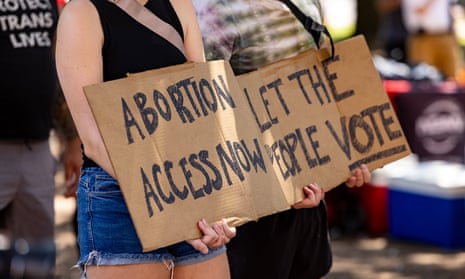In the late 60s, the burgeoning movement to legalize US abortion state by state found an unlikely yet loyal ally – a contingent of women at the First Unitarian Universalist church in Dallas, Texas.
In lieu of knitting sessions and bake sales, the church’s Women’s Alliance advocated for abortion rights and even had a hand in legally supporting Roe v Wade, the pivotal US supreme court case that protects abortion care in the US as a constitutional right.
The trailblazing women laid the groundwork for not only the church’s intrepid commitment to reproductive freedom over the decades, but today’s growing pro-choice faith community movement in Texas.
“These women had the foresight at the time to understand that abortion rights wasn’t just a debate for the moment but would be very important to future generations of women,” says Kathleen Campbell, current president of the Women’s Alliance.
“They also understood that one of the core teachings of the church is the belief that every human is worthy of love and dignity and that a woman’s right to control her own body and reproductive future is a very natural extension of that principle.”
The Dallas church has carried on their legacy for generations by openly supporting reproductive rights groups and causes, spiritually advising abortion patients, and even helping challenge onerous abortion laws in court.
Even as Texas’s leadership has become more conservative and the voices of anti-choice evangelical religious figures became louder, the church remained dedicated to its abortion advocacy.
Now, in the face of a draconian abortion ban in effect for more than three months – and the prospect of the US supreme court potentially overturning Roe v Wade next year – that mission has only grown stronger for the progressive congregation, who hope others around the US will join their movement.
‘We believe God loves us all’
Amid the feminist revolution, the Alliance grappled with what a woman’s role in society should – and could – be, and a large part of that conversation included reproductive freedom. In 1969 the organization held study groups over the next year to educate themselves on abortion procedures and laws; they heard from members of Planned Parenthood, doctors and lawyers.
At first they treaded conservatively into the issue, but soon became “passionate” about pro-choice values, according to a source closely involved at the time. They examined the moral, legal, and practical reasons to legalize abortion care and began organizing, making trips to the Texas capitol to advocate for a bill that would repeal the state’s anti-choice law, which only made an exception in the event the woman’s life was in danger.

As largely privileged white women in a conservative city, the group was also very aware that abortion would likely be accessible for them and were motivated by the fact that legal abortion care would be difficult, if not impossible, for low-income women and many women of color, a reality that persists today.
‘Jane Roe’
In 1970, Linda Coffee, an attorney and friend of the church, introduced the women to Dallas resident Norma McCorvey – known widely under the pseudonym “Jane Roe” – and told them she was about to launch a legal challenge against local district attorney Henry Wade.
Wanting to assist in any way they could, the women took the bold step of filing a legal brief on behalf of McCorvey in her pursuit to strike down the Texas law, helping spur support for what would later become Roe v Wade.
Over the decades the church has carried on the tradition of ardently supporting reproductive rights, a seemingly radical mission in a state headed by Christian rightwing leaders deeply hostile to abortion care.
“We see that moment many years ago not just as a shining era to look back on, but as a charge for us to go forward and continue to work to support reproductive rights with any opportunity in our particular moment of history,” says Campbell. “To this day, their contribution resonates, as we still very much support abortion rights.”
Among its activism the church offers comprehensive sex education, financial support to Planned Parenthood and abortion funds like the Texas Equal Access Fund, and volunteer to drive and safely escort patients to abortion clinics.
The church also has a strong presence within an abortion clinic itself. The Rev Daniel Kanter, senior minister and chief executive of First Unitarian church of Dallas, started a multi-faith rotating chaplaincy at Southwestern Women’s abortion clinic five years ago. Kanter, who has served on the board of Planned Parenthood Federation of America, and other faith leaders volunteer their time listening and spiritually guiding patients in the waiting rooms. They’ve heard heartbreaking stories about abuse and rape; about fetal anomalies that would kill the mother if carried to term; about pregnant women with children they already couldn’t support or care for. Rather than judgment, Kanter meets them with an open heart and compassion.
“While so many think all religious people are against abortion, that’s just not true,” says Kanter. “We are there to support those who have abortion, we believe God loves us all and we shouldn’t be silenced or shamed for the decisions we make about our bodies.”
And like its feminist predecessors decades ago, the church has not shied away from getting involved in major abortion cases: Kanter is a plaintiff in the legal challenge to the state’s abortion ban, Senate Bill 8. The law, which went into effect on 1 September, has devastated reproductive health care in the second largest state in the US for three months. The US supreme court failed to block SB 8 earlier this month, and sent the legal challenge from Texas abortion providers to the conservative US fifth circuit court of appeals. The law allows for any private individual to sue anyone who “aids or abets” abortion care beyond around six weeks of pregnancy, casting a chilling effect on those who seek to assist abortion patients, including clergy. SB 8, says Kanter, is an affront to religious liberty.
“SB 8 censors what clergy can say in the confines of a private counseling room,” says Kanter. “All faith leaders of all religions should be concerned by this.”
‘Taken God hostage’
With its long history of abortion rights support, it may be no wonder then that the progressive church is leading the Just Texas Reproductive Freedom Congregation movement, which launched this August. The first to join, the Dallas church and 29 others across Texas are working to remove the stigma associated with abortion.
The movement, started by the Texas Freedom Network, which was founded in 1995 by former Planned Parenthood president Cecile Richards, seeks to unite faith groups to commit to three tenets: trusting and respecting women; ensuring congregants are free from shaming people’s reproductive decisions; and believing access to comprehensive, affordable health services is a moral and social good. Congregants learn to testify at the state capitol, publish op-eds, attend marches, help abortion clinic staff and engage in other forms of activism.
“We are on a quest to wrestle God back from the religious pro-life conservatives who have taken God hostage,” says the Rev Erika Forbes, faith and outreach manager for Just Texas. “I have no doubt in my mind God is on our side and that God respects and trusts women.”
Forbes has spiritually counseled dozens of Texas women through their abortions. She says her own abortion experiences as a teenager “saved” her life and motivated her to pursue her calling, ministry. She spreads the message that it is a “divine right” for a person to choose to control their bodies and futures without shame or stigma.
The Reproductive Freedom Congregation movement plans to expand nationally in January, says Forbes. At least 50 congregations across the country have expressed interest in joining. The goal is to create a “lasting culture change” that subverts the dominant narrative that claims people of faith don’t support reproductive freedom.
That narrative often feels ingrained in US – and Texas – culture, in large part due to religious right’s success in tying anti-abortion policies to Christian family values and sexual morality, an idea boosted by the Moral Majority movement of the late 70s and 80s.
However, researchers stress that narrative is a largely false notion, or at least one that is far more complex. The religious right – mostly composed of conservative Catholics and evangelicals – carry an “outsized” and “disproportionate” influence in the overall religious community when it comes to abortion due to their strong organizing power and are not necessarily reflective of all Christian groups.
“While abortion is certainly an issue that catalyzed the Christian right, Christian conservatives don’t all sort neatly into being anti-abortion – it’s a lot more granular than that,” says Amanda Hollis-Brusky, associate professor and chair of politics at Pomona College who studies the Christian right.
Some 55% of Catholics believe that abortion should be legal in all or most cases, as do 63% of non-evangelical white Protestants and, notably, 21% of white evangelicals, a Pew Research Center study found earlier this year.
Frederick Clarkson, senior analyst with social justice think tank Political Research Associates and author of Dispatches from the Religious Left: The Future of Faith and Politics in America, has followed the Christian right for the past four decades. While Roe v Wade fueled the Christian right’s “successful efforts” to mobilize and enmesh themselves in Republican electoral politics, that approach has resulted in a “shrinking minority” led by white evangelical Protestants exercising electoral power “disproportionate” to their numbers.
Clarkson believes that the Christian right could be “dethroned” by the vast pro-choice faith community that comprises the majority or at least, near-majority, of the overall religious community in the US; it is akin to a sleeping giant waiting to be “reckoned” with.
As abortion rights are in the crosshairs nationally after the Supreme Court recently heard Dobbs v Jackson – a challenge to Mississippi’s 15-week ban that could upend Roe – the time to mobilize feels especially urgent, says Clarkson.
“If the pro-choice religious community in the US could become as organized as the Christian right and electorally focused it would be a sea change in American culture and politics,” says Clarkson. “They have the potential power to erode – or even end – the Christian right’s theocratic ambitions.”
Often overshadowed by the Christian right, Clarkson points to the long history of religious groups – including mainline Protestant denominations, Catholics and most of Judaism – supporting abortion care. For instance, the Clergy Consultation Service on Abortion comprised of 2,000 religious leaders in the late 60s was the largest abortion referral service in the US before Roe, helping thousands of women access safe care. Today, organizations like the Religious Coalition for Reproductive Choice and Catholics for Choice – both founded in 1973 following Roe – have continued to gain influence.
Of course, challenging the loudest religious voices in the room comes with its share of hostile pushback, especially in Texas. Kanter and his congregation must face vocal anti-choice protesters who rally in front of the church, as well as dozens of phone calls and letters ranging from moderate anger from fellow Christians to “extremely violent and threatening” messages, some of which Kanter has been forced to report to the FBI.
“While our views have caused some friction, we are not afraid and not backing down,” says Kanter. “We want to steer the wheel back from evangelicals and those who claim to be pro-life. We feel strong and more ready than ever to do so.”
